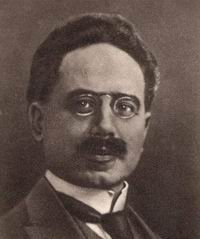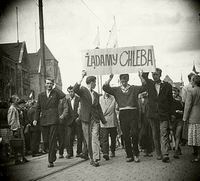Seeds of Fire: A People’s Chronology
Recalling events that happened on this day in history.
Memories of struggle, resistance and persistence.
Compiled by Ulli Diemer
|
June 28, 1914
|
|
|
The Austrian Archduke Franz Ferdinand is assassinated by a Bosnian Serb nationalist in Sarajevo. Austria-Hungary seizes on the opportunity presented by the assassination to make a series of demands on the government of Serbia, which it claims has failed to prevent terrorist plots against Austria-Hungary.
The demands are designed to weaken Serbia and undermine its independence. Serbia accepts most of the demands, but the 'War Party' in Vienna sees the situation as an excellent opportunity to launch a war which the Austrian military has long been planning for, and rejects the Serbian concessions.
On July 28, Austria declares war on Serbia. Within days, the other major imperialist powers -- Russia, France, Britain, and Germany -- have entered the war.
The Great War which ensues lasts for more than four years. By the time it ends, more than sixteen million people will have died, and more than 20 million will have been wounded.
|
|
June 28, 1916
|

|
|
50,000 German workers engage in a one-day strike to support the Socialist anti-war leader Karl Liebknecht, charged with sedition for his opposition to the government and the war.
|
|
June 28, 1920
|
|
|
In the midst of the Irish struggle for independence, Irish soldiers serving in the British Army in the Punjab mutiny, declaring they will refuse to take orders from British officers until the British withdraw from Ireland. Some 400 soldiers mutiny. They are subsequently court-martialled; one is executed, others are given long prison sentences.
|
|
June 28, 1949
|
|
|
Yugoslavia is expelled from the Cominform.
|
|
June 28 - 30, 1956
|

|
|
Workers at the Cegielski Factories in Poznan, Poland walk out, protesting pay cuts and poor working conditions. Workers from other workplaces join them, as do students from local schools. By late morning, 100,000 people have gathered in a central square.
Police move in to attack the demonstrators, and fighting breaks out that continues over the next two days. Several dozen people are killed, and about 600 are injured. Persecution of the most active participants continues for years afterwards.
The memory of the events – including the image of a supposedly ‘Communist’ regime attacking workers who are singing The Internationale and holding banners reading “We demand bread” – becomes an inspiration to other attempts by Polish workers to defend their rights.
|
|
June 28, 1969
|
|
|
Patrons at the Stonewall Inn, a gay bar in New York City’s Greenwich Village, explode in resentment at continuous anti-homosexual harassment by New York City police. They start to fight back, throwing beer cans and bricks and anything else handy. Disturbances continue for the next several nights.
One participant recalls: “We all had a collective feeling like we’d had enough of this kind of shit. It wasn’t anything tangible anybody said to anyone else, it was just kind of like everything over the years had come to a head on that one particular night in the one particular place, and it was not an organized demonstration.... Everyone in the crowd felt that we were never going to go back. It was like the last straw. It was time to reclaim something that had always been taken from us.... All kinds of people, all different reasons, but mostly it was total outrage, anger, sorrow, everything combined.”
In the aftermath, people come together in meetings to talk about organizing to fight for their rights in an ongoing way. The event comes to be seen as the birth of the modern gay rights movement in the United States.
|

